How Smart Water Sensors Can Save Homeowners Thousands in 2025
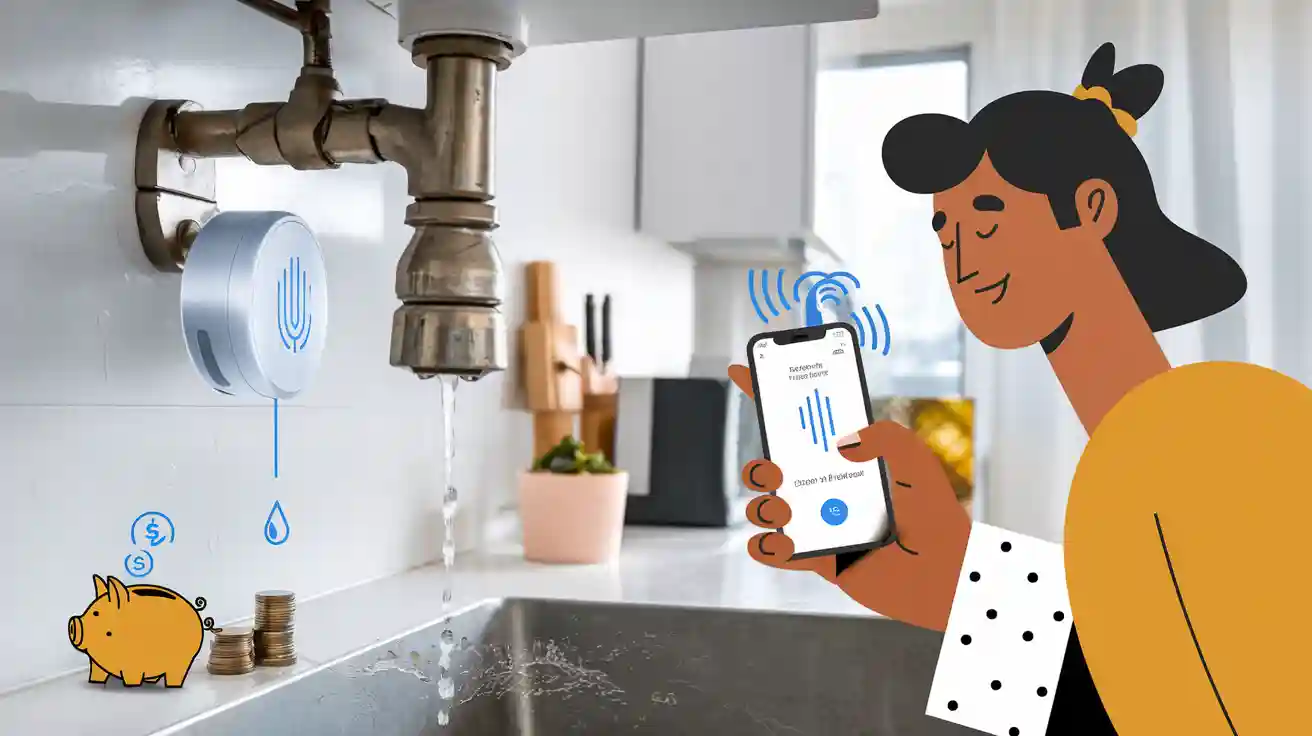
Imagine waking up to find water all over your kitchen floor. A hidden leak can cost you thousands before you even notice it. Smart water sensor technology helps you catch leaks early, so you avoid major damage and expensive repairs. In fact, water damage claims cost the average homeowner nearly $14,000—just one inch of water can ruin your property. You can protect your home and get real protection with a smart water sensor, giving property owners peace of mind.
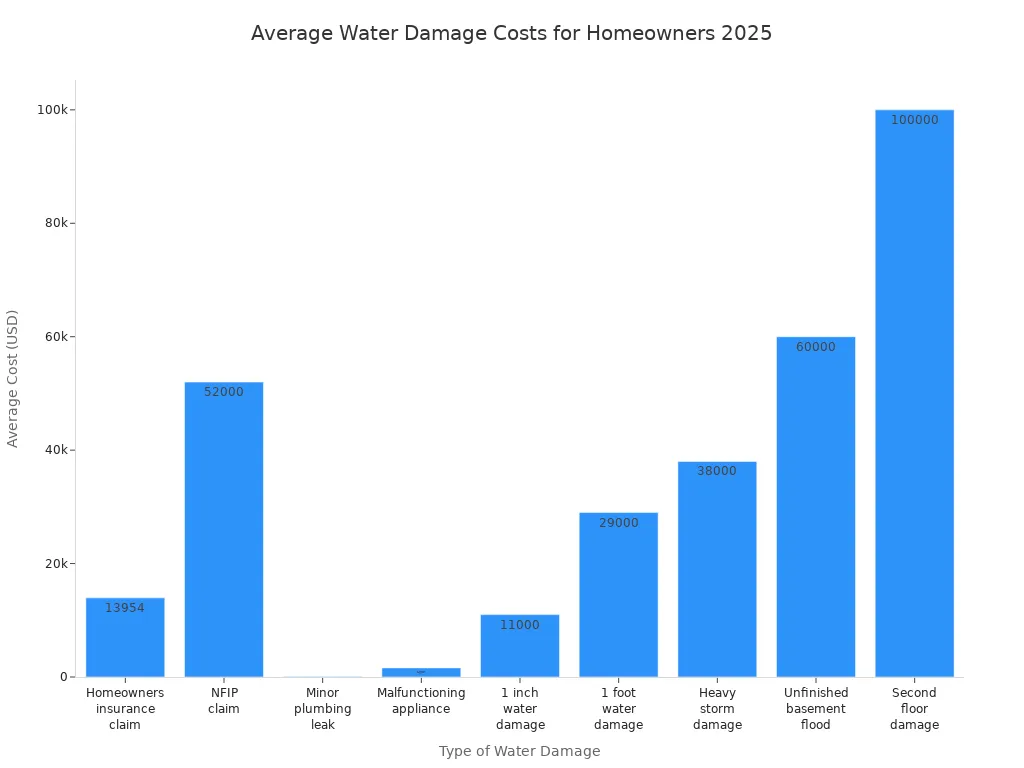
What Is a Smart Water Sensor?
A smart water sensor is a small device that helps you catch leaks before they become a big problem. Unlike old-fashioned detectors, these sensors use advanced technology to spot leaks early, even if you can’t see or hear them. They work as your first line of defense, giving you a total home water protection solution.
How Smart Water Sensors Work
Smart water sensors use different methods to find leaks. Some sense water by direct contact, while others listen for sounds or watch for changes in water flow. Here’s a quick look at how they compare:
| Sensor Type | How It Works | Detection Method | What Makes It Different? |
|---|---|---|---|
| Spot Leak Sensors | Alert you when water touches the sensor. | Direct contact with water | Good for one spot, like under a sink. |
| Flow-Based Leak Sensors | Monitor water flow in your pipes and spot leaks by finding odd patterns. | Indirect, checks flow changes | Can catch hidden leaks, even if water doesn’t touch the sensor. |
| Ultrasonic Leak Sensors | Listen for high-pitched sounds made by leaking water, even behind walls. | Indirect, uses sound waves | Detects leaks you can’t see, like inside walls or ceilings. |
These sensors often connect to your phone or smart home system. You get alerts right away, so you can act fast and stop water damage.
Key Features of Water Leak Sensors
When you look for water leak sensors, you’ll notice they come packed with helpful features:
- Built-in alarms that sound if a leak starts
- Long battery life, sometimes up to three years
- Temperature and humidity monitoring to warn you about frozen or broken water pipes
- Wi-Fi or hub-based connections for real-time alerts
- Integration with smart home systems like Alexa or Google Assistant
- The ability to trigger automatic shutoff valves for a true leak protection solution
Tip: Many smart water leak sensors also monitor for changes in temperature and humidity. This helps you spot problems before they turn into big repairs.
Where to Install Smart Water Sensors
You want to place your smart water sensor in spots where leaks are most likely to start. Strategically placed sensors give you the best chance to catch trouble early. Here are the top places:
- Under sinks in kitchens and bathrooms
- Around water heaters and washing machines
- Inside cabinets below dishwashers
- At the base of toilets
- Near refrigerator water lines
- By HVAC units and basement walls
If you use flow-based sensors, install them on your main water line after the meter. Make sure the spot is easy to reach for maintenance. With strategically placed sensors, you can monitor your home for leaks and enjoy real leak protection.
How Smart Water Sensors Prevent Costly Water Damage
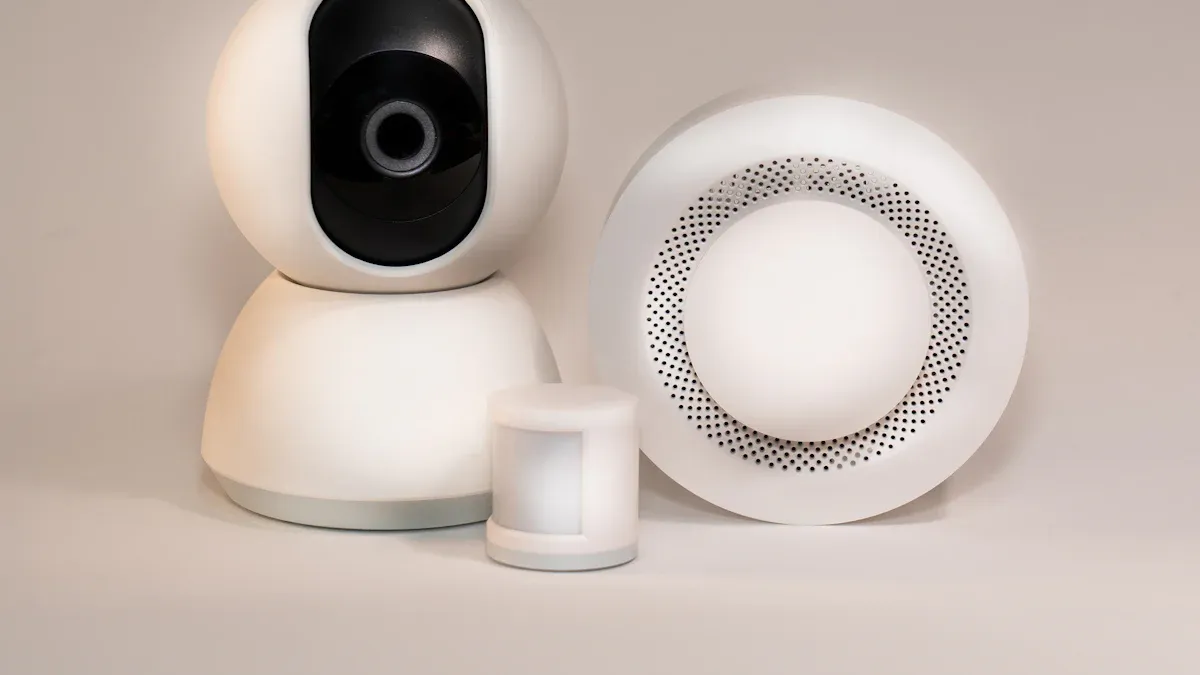
Early Leak Detection and Alerts
You want to stop water damage before it starts. Smart water sensors help you do just that. These devices can detect leaks quickly, even if you cannot see or hear them. They use advanced technology to monitor your home for any sign of trouble. When a leak happens, you get an alert right away. This early warning gives you time to act before a small drip turns into a big problem.
Recent studies show that smart water sensors use real-time data and artificial intelligence to detect leaks much faster than old methods. Traditional inspections take time and often miss hidden leaks. Smart sensors work around the clock, so you never have to worry about missing a leak while you sleep or leave the house.
Here are some real-life examples of how early detection saves money and prevents potential water damage:
- A homeowner installed a smart system and found a slow drip behind the washing machine. Fixing a $5 valve stopped a $5,000 flood.
- In apartment buildings, leak detection systems stopped major water damage events. The systems paid for themselves in just six months.
- Smart water sensors use flow-based monitoring and point-of-contact sensors in high-risk spots. They catch leaks early and help prevent significant damage.
You can see how these sensors help prevent costly water damage and keep your home safe.
Automatic Water Shutoff Capabilities
Sometimes, a leak can happen when you are not home. That is where automatic water shutoff features come in. If a sensor detects a serious leak, the system can shut off your water supply right away. You do not have to rush home or call a neighbor. The system takes care of it for you.
Case studies show that automatic shutoff systems work well to prevent water damage inside the home. When a pipe bursts or a hose fails, the system stops the water before it can cause major damage. This quick action can save you thousands of dollars in repairs. You also get peace of mind, knowing your home is protected even when you are away.
These systems also help reduce water waste. They make your home more efficient and can even lower your insurance premiums. Insurance companies know that smart water sensors with shutoff features provide strong water damage prevention.
Real-Time Notifications to Your Phone
You do not want to miss an alert about a leak. Smart water sensors send real-time notifications straight to your phone. You get messages by app, text, or even email. Some systems can call you if there is a problem. This means you can respond fast, no matter where you are.
- Moen Flo Smart Water Monitor & Shutoff sends app, phone call, and email alerts for leaks and freezing.
- Vivint Water Sensors send instant alerts for excess moisture, water detection, and temperature drops.
- Notifications let you act quickly, reducing damage and repair costs.
- 24/7 monitoring teams can help you respond to alerts and connect you with local plumbers.
These real-time alerts help you prevent water damage before it gets worse. You can monitor your home from anywhere and stop potential water damage in its tracks.
Tip: Set up your notifications so you never miss an alert. Fast action is the best way to prevent costly water damage.
How Much Money Can Smart Water Sensors Save You?
Average Cost of Water Damage Repairs
Water damage can hit your wallet hard. You might think a small leak is no big deal, but even a little water can cause big problems. The average cost of water damage repairs in the U.S. is about $11,000 per claim. If you have just one inch of water in your home, you could face over $25,000 in repairs. That’s not just for fixing the leak. You may need to pay for new floors, walls, and even mold removal. Sometimes, you might even have to move out while repairs happen.
Here’s what can drive up the cost of water damage:
- Structural repairs to walls, floors, and ceilings
- Mold cleanup and prevention
- Replacing damaged furniture and appliances
- Temporary relocation costs if your home is unsafe
If you catch leaks early with smart water leak sensors, you can avoid these huge bills. These sensors give you a chance to stop the problem before it gets out of hand. You save money, time, and stress.
Did you know? Early leak detection can also help you avoid higher insurance premiums and health risks from mold.
Real-World Savings and Statistics
You want real numbers, not just promises. Smart water sensors have proven they can cut costs and reduce property damage risk. A 2020 study by Lexis Nexis looked at over 2,300 homes. After installing smart water shutoff devices, homeowners saw a 96% drop in water damage claim events. That means fewer leaks turned into disasters.
The same study found a 72% decrease in the severity of water damage claims within just one year. So, not only do you have fewer claims, but the claims that do happen cost much less. Homeowners who use water leak sensors often report saving thousands of dollars by catching leaks early.
Let’s break down the benefits:
- Water damage is one of the most expensive types of home repairs, with average claims over $11,000.
- The longer a leak goes unnoticed, the higher the cost of water damage.
- Smart water sensors send real-time alerts, so you can stop leaks before they cause major damage.
- Sensors that detect freezing temperatures help prevent burst pipes, which can cost over $5,000 to fix.
- Early detection means lower repair bills, fewer insurance claims, and less stress for you.
You can see how these devices protect your home and your wallet from potential water damage.
Insurance Discounts for Water Leak Sensors
Insurance companies know that smart water leak sensors work. Many now offer discounts if you install them in your home. These discounts can add up to real savings on your yearly premium. Some companies even give you free devices or monitoring services.
Here’s a look at what top insurance companies offer:
| Insurance Company | Discount Offered for Smart Water Leak Sensors | Typical Savings | Additional Notes |
|---|---|---|---|
| Nationwide | Free smart water leak detectors in 38 states + D.C. | Up to 10% discount, averaging $275/year | No monthly fees; free device; sensors alert for leaks |
| State Farm | Free ADT water leak detection system in 10 states | Up to 6% discount, about $91/year | Requires 3-year monitoring contract costing ~$240/year, which may offset savings |
| USAA | Discounts with multiple home security systems including water leak detectors | Not specified | Discount varies; not available in some states; monitoring fees may apply |
| VYRD (with Phyn) | Free smart water sensing kit | 40% discount on portion of premium (~$400) starting Feb 1, 2025 | Includes free sensors and 24/7 monitoring; no shut-off device included |
| Amica | Discounts on various leak detection systems (Flo by Moen, Flume, Guardian, Phyn Plus, Stream Labs) | Varies by system; expensive systems may not recoup cost | Savings depend on system cost and home plumbing age |
| Allstate | Discounts for smart home safety features (e.g., Canary system) | Up to 5% discount (~$103/year) | Discount tied to use of Canary security system; mostly for fire/theft protection |
| Hippo | Complimentary smart home monitoring system | Average savings $64 to $91/year | Discount contingent on keeping system activated |
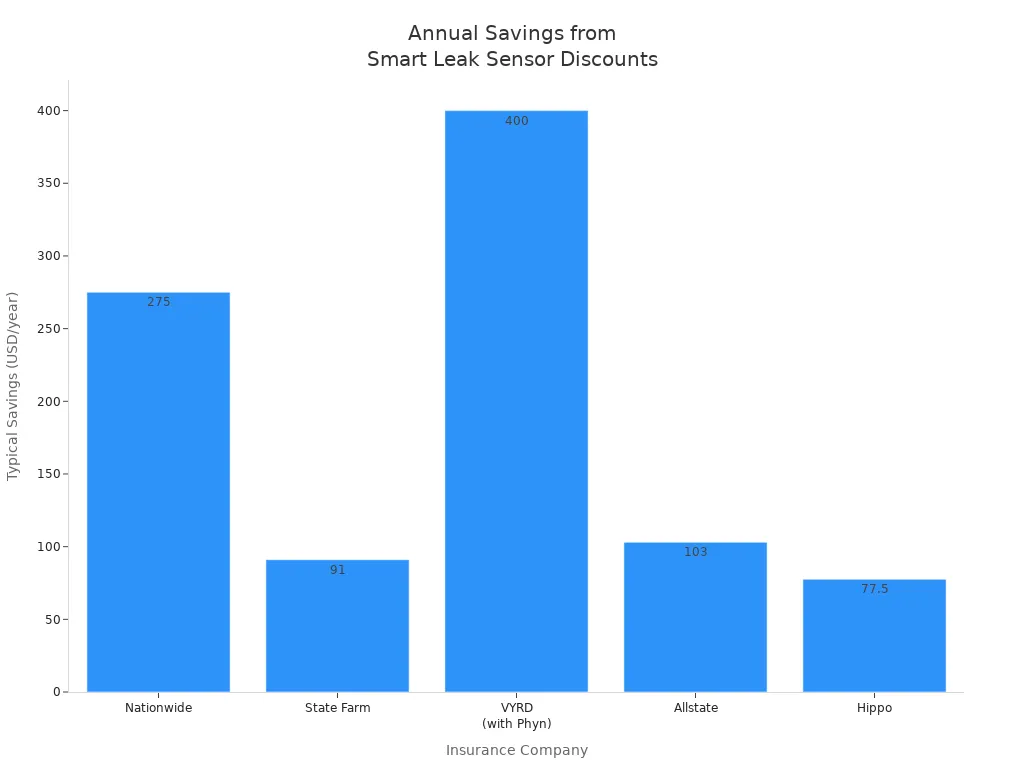
Some companies, like VYRD, go even further. If you get a new policy with them, you receive a free smart water sensing kit and a 40% discount on part of your premium. That’s about $400 in savings, plus 24/7 monitoring and no extra fees. Customers love the peace of mind and the extra money in their pockets.
Tip: Ask your insurance agent about discounts for water leak sensors. You could save hundreds each year and lower your property damage risk.
Extra Benefits of Smart Water Sensors for Homeowners
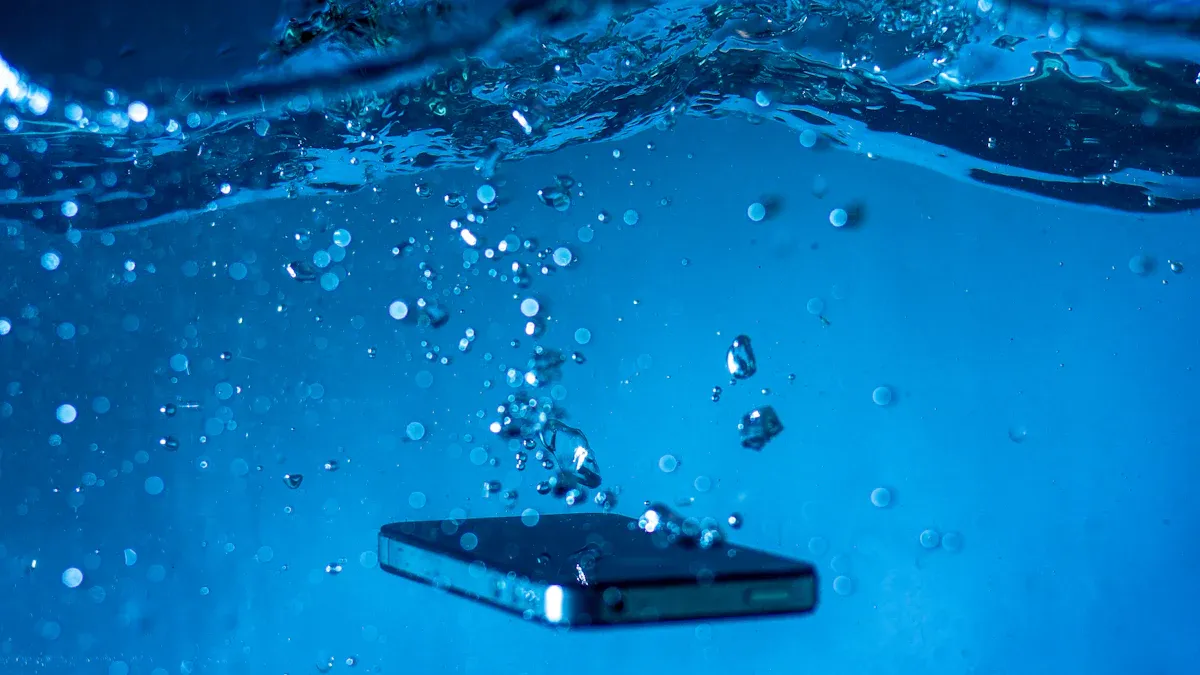
Reduced Water Waste and Lower Utility Bills
You might not realize how much water a small leak can waste. Smart water sensors help you spot leaks early, so you stop waste before it gets out of hand. These sensors use ultrasonic technology and AI to track your water use with great accuracy. You get real-time alerts if something looks wrong, like a slow drip or a running toilet. Many sensors even show you which appliance uses the most water.
- Track water use by each fixture or appliance
- Get instant alerts for leaks, even tiny ones
- Control water flow from your phone, even when you are away
- Automatic shutoff stops leaks and saves water
Smart water sensors can reduce up to 90% of household water waste. The EPA says leaks waste over 1 trillion gallons of water every year in the U.S. By catching leaks early, you lower your water bill and help the environment. You also avoid extra costs from wasted energy if your water heater leaks. These sensors make it easy to protect your home and your wallet.
Peace of Mind and Less Stress
You want to feel safe in your home. Smart water sensors give you that peace of mind. They alert you right away if they find a leak, so you can act fast and avoid water damage. Many property owners say they sleep better knowing their home is protected. Some systems even shut off the water for you if you are not home.
Surveys show that 42% of homeowners feel less anxious with smart home technology. Most users say they feel more secure and less stressed about possible water damage.
Insurance discounts add another layer of comfort. You know you are saving money and protecting your home at the same time. Quick alerts and automatic shutoff mean you do not have to worry about coming home to a big mess.
Boosting Home Value and Appeal
Smart water sensors do more than just stop leaks. They make your home more attractive to buyers. Many people look for smart features when they shop for a new house. If you have a system that helps prevent water damage, you stand out from other property owners.
- Modern buyers want homes with smart protection
- Water sensors show you care about maintenance and safety
- Lower risk of water damage means fewer repairs for new owners
Adding smart water sensors can boost your home’s value and appeal. You protect your home, save money, and make your property more desirable to future buyers.
How to Get Started with Smart Water Sensors in 2025
Choosing the Best Smart Water Sensor
You want a sensor that fits your home and keeps you safe from leaks. Start by thinking about what you need. Some sensors only detect water, while others also check temperature, humidity, or even motion. If you want extra protection, look for models like the Aeotec Multisensor 6 that work with your smart home system.
Here’s a quick table to help you compare features:
| Feature | Why It Matters |
|---|---|
| Sensitivity | Finds even tiny leaks quickly |
| Connectivity | Sends alerts to your phone or smart home hub |
| Durability | Works in wet or dusty places (look for high IP ratings) |
| Power Source | Long battery life or plug-in options |
| Alerts & Notifications | Loud alarms and phone alerts for fast action |
| Installation | Easy setup, clear instructions |
| Integration | Works with Alexa, Google, or other smart devices |
| Budget | Good value for the features you get |
Tip: Read user reviews before you buy. Some sensors have better battery life or fewer false alarms.
Where to Place Water Leak Sensors in Your Home
You get the best results when you put sensors where leaks are most likely. Place them right next to appliances or pipes that could cause trouble. Here are some smart spots:
- Under washing machines and dishwashers
- Next to water heaters and sump pumps
- Under sinks in kitchens and bathrooms
- By toilets and inside cabinets
- In basements near pipes or windows
- Under refrigerators and in garages
If you have a big home, use more than one sensor to cover all risky areas. Some sensors use cables to cover a larger space, which helps in basements or around water tanks.
Simple Installation and Setup Steps
Most smart water sensors are easy to install. You can do it yourself without special tools. Here’s how you get started:
- Download the app from the sensor’s brand.
- Create an account and connect the sensor to your Wi-Fi.
- Place the sensor in a leak-prone spot.
- Test the sensor by adding a drop of water to make sure it works.
- Set up alerts on your phone so you never miss a warning.
Wireless sensors are the easiest. If you pick a wired model, you might want help from a pro. Always follow the instructions for safety. If you run into trouble, check the app or call customer support.
Note: New sticker-like sensors make it even easier to protect hard-to-reach places, like behind built-in dishwashers.
You want to protect your home and save money. Smart water sensors give you real-time alerts, automatic shutoff, and peace of mind. Many property owners see fewer insurance claims and lower premiums. Take a look at these long-term benefits:
| Benefit Aspect | Details |
|---|---|
| Fewer water leak claims | Homeowners with sensors file fewer claims than those without. |
| Lower insurance premiums | Eligible for up to 15% discount on non-weather-related leaks. |
| Higher policy retention | More property owners renew their policies after installing sensors. |
You also get these advantages:
- Quick alerts help you stop leaks before they cause damage.
- Easy installation fits any home.
- Continuous monitoring keeps your property safe 24/7.
Don’t wait for a disaster. Install smart water sensors now and keep your home protected in 2025.
FAQ
How do smart water sensors send alerts?
You get alerts right on your phone. Most sensors use Wi-Fi or Bluetooth. Some even send text messages or emails. You can set up notifications in the app, so you never miss a warning.
Do smart water sensors need professional installation?
Nope! You can install most sensors yourself. Just follow the instructions in the box or app. Stick the sensor in a leak-prone spot, connect it to Wi-Fi, and test it. If you want, you can call a pro for help.
Will smart water sensors work during a power outage?
Some sensors use batteries, so they keep working if the power goes out. If your sensor connects to Wi-Fi, you might lose remote alerts. Local alarms still sound, so you can hear them at home.
Can I use smart water sensors in apartments or rentals?
Yes, you can! These sensors work great in apartments or rental homes. They do not damage walls or floors. You can take them with you when you move. Just check with your landlord before installing anything permanent.